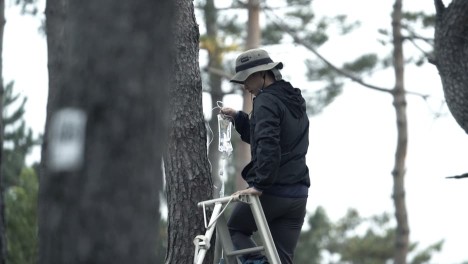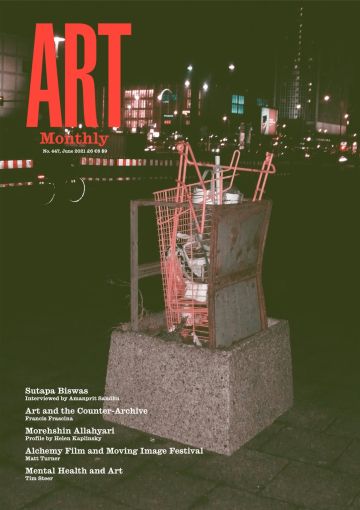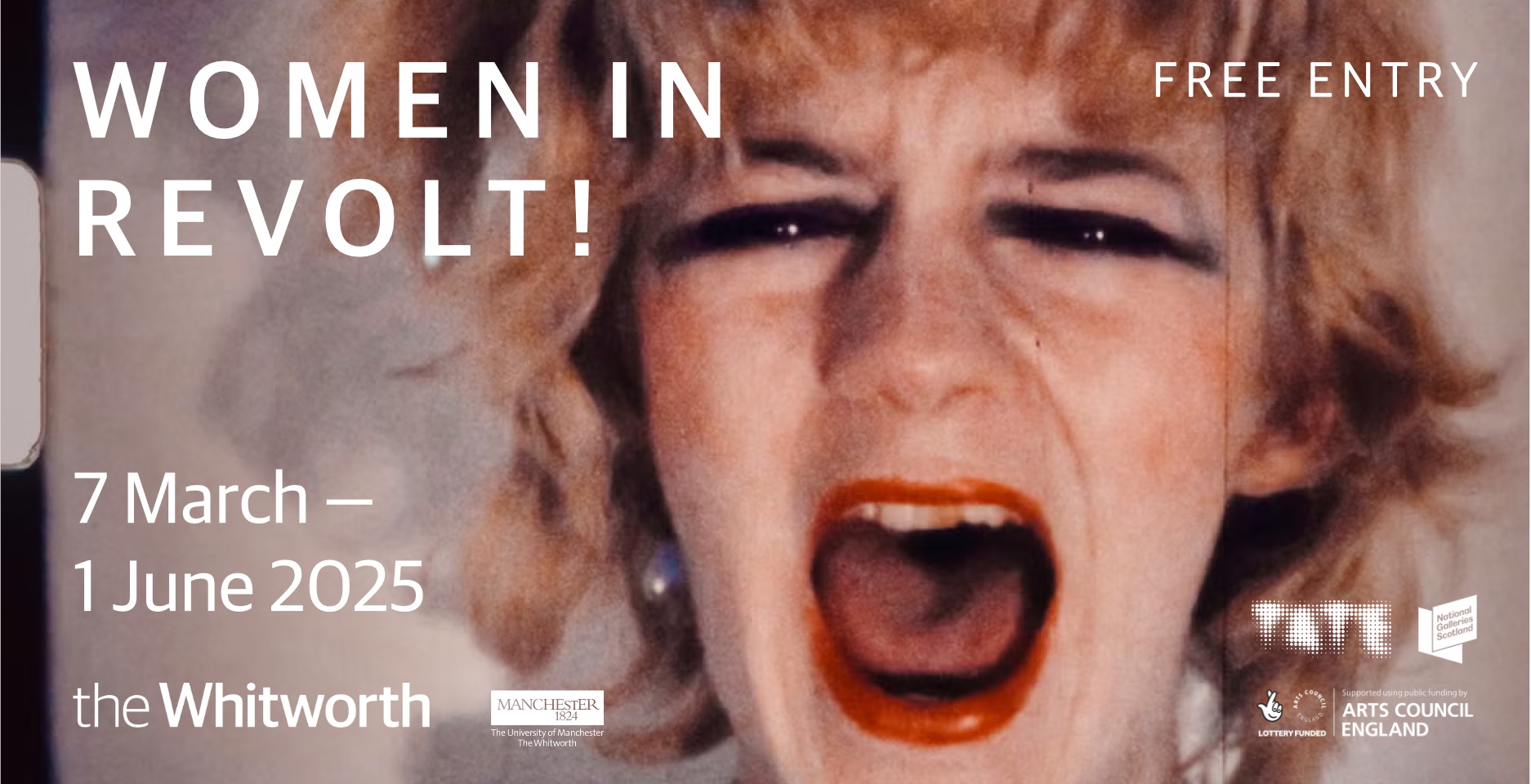Report
Mental Health and Art
Tim Steer on art projects that reveal the sociopolitical roots of mental-health issues

Jeamin Cha, Sound Garden, 2019
I have been thinking about mental health a lot over the past year. Mental disorder is known to be one of the most widespread, chronic and disabling health conditions in the global north. Back in 2017, the World Health Organisation found that depression was the main cause of ill health and disability worldwide. In the UK, the withdrawal of welfare provisions has only increased the burdens of mental distress, not to mention an estimated 130,000 excess deaths due to austerity policies (according to the Institute for Public Policy Research). After successive cuts to public health budgets over the past decade, the NHS charged the government with ‘structural discrimination’ against mental health provision.
In ‘The Privatisation of Stress’, 2011, Mark Fisher laid out the relationship between neoliberalism, austerity and mental health, describing how current psychiatry depoliticises unhappiness by shifting the blame onto an individual’s neurochemistry. Referencing Dan Hind, Fisher noted that the logic behind Margaret Thatcher’s statement that ‘there’s no such thing as society. There are individual men and women’, is also shared by the current psychiatric model which defines mental illness as the outcome of an individual’s brain chemistry rather than social and environmental conditions. The 2017 Lancet Psychiatry Commission on the Future of Psychiatry proposed that psychiatry should follow an ‘integrative biopsychosocial-cultural formulation’. Arguing that ‘social determinants of mental illness and the role of social discrimination in the causation of mental illness deserve study’ and that ‘both advocacy against poverty and unemployment and equitable funding into […] social research is needed’. The report recognised that current psychiatry is an overly medicalised profession, one which prioritises neurobiological research that falls short on diagnosis and treatment, largely overlooking the multiple causes which lead to mental disorders such as depression. Studies have shown that social adversity, such as poverty, change the neurobiological ability to cope with stress and depression. As noted by leading psychiatrist Nikolas Rose, instead of ‘brain disorders’, these conditions could better be described as ‘social adversity disorders’.
This year’s proposed welfare cuts, made in response to Covid-19 (predicted to leave over three million UK residents in poverty) will only further the social conditions that affect mental disorder. The Office for Budget Responsibility has also predicted that, over the long-term, Brexit will reduce GDP by 4%, exceeding the forecasted costs of the pandemic. All accounts point to an impending mental health crisis, with psychiatrists warning that Covid-19 will pose the ‘greatest threat to mental health since the Second World War’, the results of which will have a lasting impact over the coming years.
Recent contemporary art projects, such as the ICA’s programme ‘THIS WORLD MAKES US SICK’, devised by the bare minimum collective, and the lecture series ‘Don’t Worry I’m Sick and Poor’, have pointed to the relationship between neoliberalism, illness and mental health. Hosted online, these presentations, comprising anti-labour manifestos, workshops and screenings, have covered subjects of illness, disability, work and solidarity, while also critiquing the system of art production, which is dependent on the exploitive and unpaid labour of artists and benefits from networks of care and mutual aid. A workshop by author Lola Olufemi asked the questions: ‘What has capitalism done to our condition of being?’ and ‘How do we transform our conditions and abandon the pathologising logics that tell us we are the cause of our own pain?’
Last year Whitechapel and MIT published Health as part of the Documents of Contemporary Art anthologies, bringing together writers, theorists and artists such as Anne Boyer’s response to Covid-19, Carolyn Lazard, David Wojnarowicz and the anti-psychiatrist RD Laing. More recently, in April, the Korean Cultural Centre’s online viewing room screened Jeamin Cha’s Sound Garden, 2019, a video work that looks at the practice of counselling as an introspective tool and ‘the entangled relationship between mental health and neoliberalism’.
Over the course of last year, the artists Sophie Carpetian and Jakob Jakobsen produced a series of podcasts titled Social Crisis! Mental Crisis! on Hospital Prison University Radio. Critically, as service users themselves, the artists speak from personal experience about the failings of the psychiatric system and the culpability of capitalism. Carpetian references Theodor Adorno’s Minima Moralia: Reflections from Damaged Life, 1951, to claim that, since the capitalist system itself is sick, it would be odd if people were not also mentally sick. David Harvey notes that, under neoliberal capitalism, illness is defined as the ‘inability to go to work’. Similarly, the collective bare minimum’s manifesto calls for the refusal of work in the face of neoliberal precarity and exploitation. The group also calls for ‘a movement of the idle, the lazy, the drop outs, as a resistance strategy against the return of neoliberal normal’.
Some of these approaches share the objectives of the activist health organisations that emerged out of the 1970s, such as the SPK (Socialist Patient Collective), which was a radical therapist group in Germany that claimed to be the first self-managed patient organisation in the world. The collective emerged from the initiatives of doctors working from a Heidelberg clinic who attempted to address how capitalism plays a part in mental illness. The SPK’s therapeutic practice largely centred on facilitating political consciousness through an explicitly anti-capitalist analysis. The group’s manifesto Turn Illness into a Weapon privileged critical theory and social care over specialised medical models, and reframed illness away from the responsibility of an individual (defined as a pathologised and biological condition) to that of the systemic social and political structures that govern society. Differing from anti-psychiatrists who looked inwards, such as Laing, the SPK traced commonalities with others to initiate a more political than existentialist project. The SPK believed that illness was the manifestation of alienation, repression and isolation, and that depression, anxiety and sexual dysfunction, for example, were symptoms of capitalism. But the group also argued that illness contained the force to change the conditions that generated it. The SPK was overly ambitious in its scope, with many of its stated goals being difficult for even a well-funded, major political organisation to achieve. In 1971, a year after its inception, the group disbanded after the government arrested its founder, Wolfgang Huber, during a police raid; disinformation campaigns had led to the group being associated with the Red Army Faction.
The Mental Patient’s Union was one of the first service-user movements in the UK, forming in 1973 to resist the practices of psychiatry, which was seen by the union as a repressive tool of the capitalist state. The group made a comprehensive list of patient demands, including the abolition of compulsory treatment, the abolition of irreversible psychiatric treatments, banning the term ‘mental subnormality’ and the abolition of compulsory work. The group’s attempts to hold meetings were broken up by medical staff, and patients that were found producing pamphlets were put on higher doses of medication and the publications were censored.
It is important to note that the acknowledgement of social determinants in mental health, such as the impact of the pandemic, austerity measures or other neoliberal conditions, does not disregard other factors involved in mental distress. Elizabeth Wilson’s insightful analysis of the mutually contingent relationship between biology, psychology and the social environment in Psychosomatic: Feminism and the Neurological Body, 2004, gives a useful approach in how a critical social study of mental illness can be integrated with neurobiology. Wilson’s argument goes beyond biological, psychological or social determinism in defining mental disorder by proposing an integrative model in which the social, neurobiological, and psychological features of mental illness are enmeshed: contingent systems which we are always negotiating. Like the Lancet’s call for an integrative biopsychosocial-cultural position, the factors involved in mental distress should be mutually constitutive without privileging one over another.
However, re-evaluating the social determinants of mental illness might begin to question the dominant model that currently diagnoses these conditions as an individual’s neurochemical imbalance, a model that leads to an avoidance of assigning responsibility to the UK government’s policies that have withdrawn welfare and community services for decades. Recent art projects and collectives have helped to better understand the process and, like earlier activist health groups, they hopefully offer new ground to contest those conditions.
Tim Steer is an independent curator and writer based in London.
First published in Art Monthly 447: June 2021.











